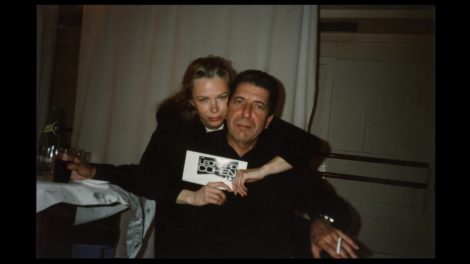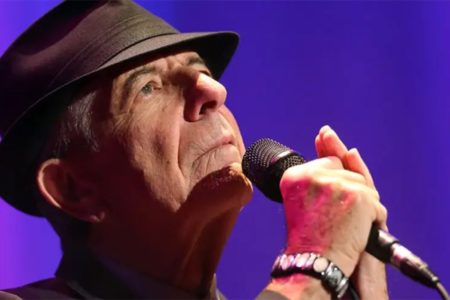Hallelujah: Leonard Cohen, A Journey, A Song
Tropic Sprockets by Ian Brockway
[mr_rating_result]There is a new documentary on the legendary Leonard Cohen from Dayna Goldfine and Dan Geller, focusing on the evolution of the classic Cohen song “Hallelujah.” Though single-minded in its subject, the film is brisk and engrossing, sure to please lifetime fans as well as the uninitiated.
 We see Cohen meeting Judy Collins. He is a very nervous man. Collins is struck by the intense Cohen and pushes him to sing his hit “Suzanne.” He reluctantly agrees.
We see Cohen meeting Judy Collins. He is a very nervous man. Collins is struck by the intense Cohen and pushes him to sing his hit “Suzanne.” He reluctantly agrees.
When Cohen takes the stage, the guitar is out of tune. The singer is mortified and quickly exits only to return later as an audience hit.
Cohen works steadily. He collaborates with John Lissauer recording New Skin for the Old Ceremony. Producer Lissauer gives his stamp on the album, only to have Cohen vanish for eight years.
When Cohen re-emerges, he records the breakthrough album Various Positions which mixes interest in Judaism with secular thought and personal rumination. He considers it his best album to date. There is only one problem: the record executives reject the work, largely confused.
Bereft, Cohen retreats to Mount Baldy and begins his journey with Zen, where there are no labels.
Various Positions is published with a small company. The track “Hallelujah” is on the album. No one seems to take notice, except for Bob Dylan who is hooked by its spiritual charge and plays it at a concert.
Cohen is invigorated and meets Dylan in Paris. A rapport develops between them, most likely playfully sarcastic in nature.
Record producers push Cohen to re-introduce “Hallelujah.” Cohen suggests John Cale of the Velvet Underground and he loves the song. Cale’s version is spaced out, existential and eerie.
 From that point forward, the song becomes a sonic chain letter. Jeff Buckley hears the song by chance and does his own version which is compared to the voice of an angel. Brandi Carlisle does an interpretation, so does country singer Eric Church, spontaneously as an experiment. The song is projected countless times on American Idol and The Voice. In the documentary, “Hallelujah” is compared to a musical virus with a life of its own.
From that point forward, the song becomes a sonic chain letter. Jeff Buckley hears the song by chance and does his own version which is compared to the voice of an angel. Brandi Carlisle does an interpretation, so does country singer Eric Church, spontaneously as an experiment. The song is projected countless times on American Idol and The Voice. In the documentary, “Hallelujah” is compared to a musical virus with a life of its own.
Through it all Leonard Cohen is very like a monk. He is a smoky lyricist with a film noir sensitivity for the apprehensive, the dangerous, the mysterious and that which is impossible to name.
By day, he lives for coffee and cigarettes, cloaked in a dark suit and christened with a fedora hat.
In his last recordings, one gets the feeling that Cohen walked towards his shadows and not away from them. Cohen emerges as one part William Burroughs in his dark suit with an awareness of mystical magnetism, the other a scientist, analyzing and recording his own living as well as dying. All of these pushes and pulls add up to a complete Leonard Cohen, calling out the universe.
Write Ian at ianfree11@yahoo.com


Ratings & Comments
[mr_rating_form]